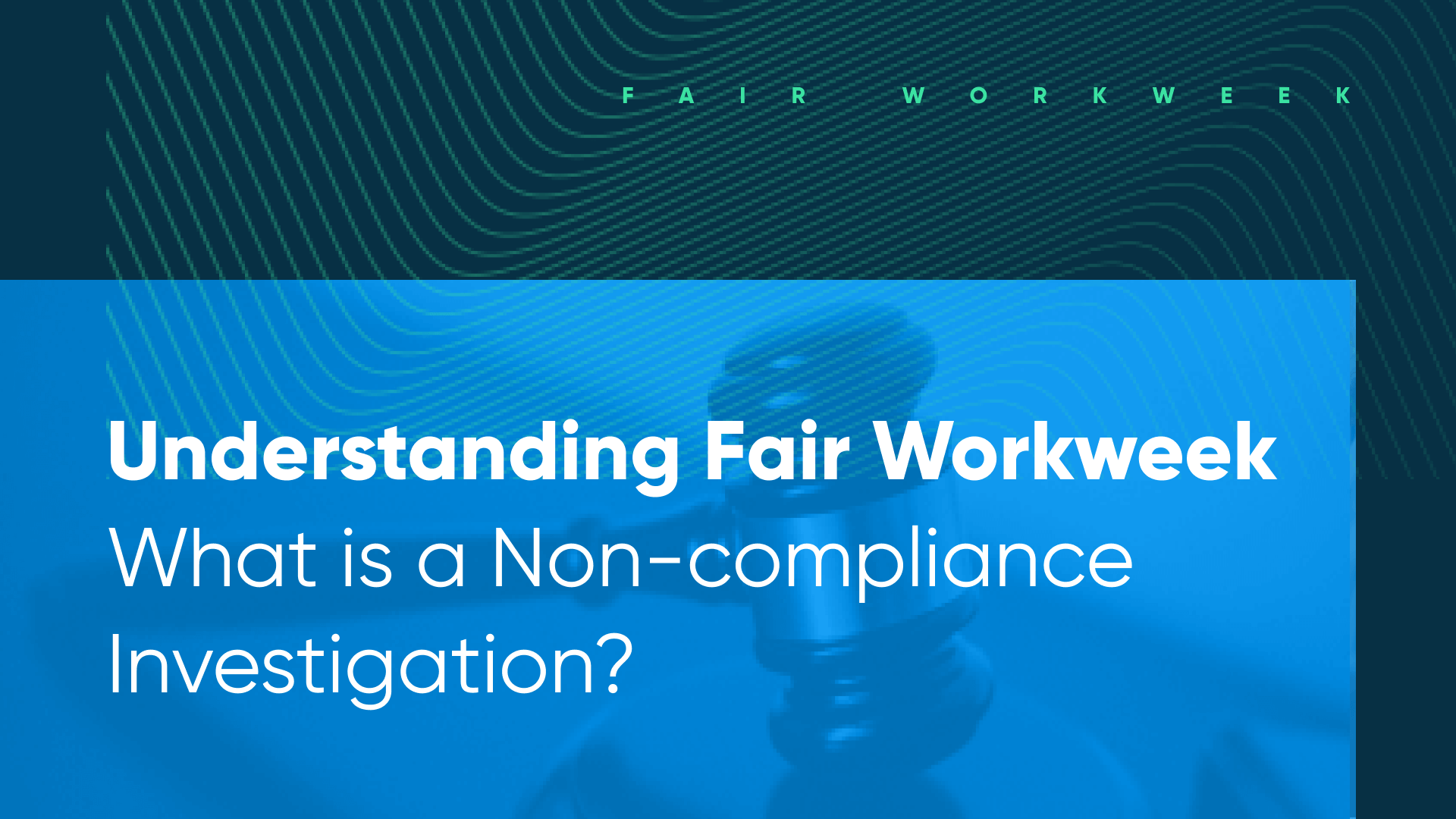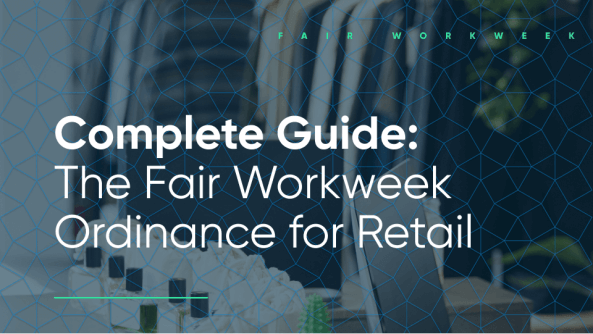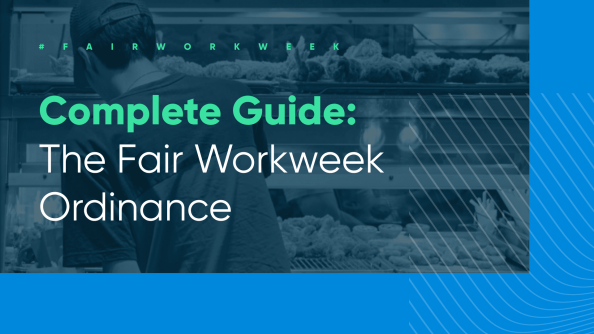Understanding Fair Workweek: What is a non-compliance investigation?

- By Harri Insider Team | January 4, 2021
Fair Workweek labor regulations affect more than 11.4 million workers in service-driven industries. With so many covered employees, restaurant operators need to be well aware of what a Fair Workweek violation is and what a non-compliance Fair Workweek investigation looks like.
Fair Workweek laws were created to ensure reasonable and predictable working hours for service-based employees by ensuring fair scheduling practices. However, despite the good intentions behind the laws, they’re extremely complex and many employers find it difficult to keep up.
But while compliance is costly, non-compliance is moreso. Businesses that fail to comply with or outright ignore Fair Workweek labor laws will face hefty legal fees on top of compensation owed to any impacted employees.
Fair Workweek is beginning to have an impact on new markets and its effects have expanded into other industries that are now making favorable additions to their own rules and regulations.
Below, we explain non-compliance events that may lead to a Fair Workweek investigation, as well as what an investigation looks like. Be sure to check out our list of Fair Workweek resources at the bottom of the article!
What does a Fair Workweek non-compliance investigation look like?
There are varying levels of consequences for businesses that do not follow the Fair Workweek rules. Businesses reported for non-compliance violations will undergo a workplace investigation which can result in hefty fines and other penalties.
The steps are provided below that detail the order in which a complaint is made and the procedures that follow.
Step 1: A violation complaint is filled
Fair Workweek non-compliance claims may be filed within two years of the date of the alleged violation. With that in mind, companies may be subject to large backpayments for unreported violations. These can even extend to past employees who are no longer with the company.
Employers who fail to comply with the following are subject to a Fair Workweek violation investigation:
- Provide good faith estimates.
- Post employee work schedule in advance (advance periods vary by city or state)
- Pay predictability pay.
- Offer new work hours to existing employees before hiring new employees.
- Obtain employee consent for adding additional hours to the posted work schedule.
- Allow right to rest periods
- Store Fair Workweek records for two years.
- Post notice in an accessible location.
- Retaliating against employees for exercising their rights under Fair Workweek laws.
Step 2. Valid complaint is received, investigation begins
Businesses or restaurant operators under investigation must provide compliance offices with requested information proving that they were compliant, or that they did violate Fair Workweek laws.
Complaints may cover a single employee or may be made on behalf of the entire restaurant staff.
This can include anything from posted schedules, schedule changes and when they were made, premium payments made to employees, or other records related to the violation reasons listed above.
Whoever filed a complaint against the business will remain anonymous, whether they are part of the business or not, unless identity disclosure is necessary to complete the investigation. In these scenarios, the person filing the complaint will be notified that their identity will be revealed. For example, if an employee claimed that they were not paid a premium payment, their identity may need to be revealed during an investigation of their payments sent from the employer.
Please note that Fair Workweek investigations are not exclusive to violation claims. Compliance offices may also open investigations on their own initiatives.
Step 3. The complaint is accepted or denied
The results of the investigation will include the number of complaints, the nature of the complaints, how many were classified as violations, and the outcome of each complaint including the method of resolution.
Fair Workweek violations will need to be paid to the affected employees and to the state’s labor department. Violations that were found to not violate Fair Workweek law will not impose penalties to the restaurant operator.
Violation penalties can vary by state, city, or severity of the violation, varying from $75 to over $500 per violation. To learn what penalties your business may face, check the Fair Workweek ordinance laws for each location your business operations in.
Staying Fair Workweek compliant with Harri
Harri offers the most cohesive HCM solution on the market to support operators in navigating the operational burden Fair Workweek regulations impose. We help empower your teams with the ability to manage schedules, monitor scheduling fees, and properly report premium pay.
Prompt schedules and non-compliance alerts
With Harri, each business location can be set to create advanced notice scheduling based on the unique Fair Workweek requirements of that location’s city or state. If you need to create and distribute 30-day team schedules two weeks in advance, Harri will notify your managers when those deadlines are approaching to ensure compliance.
Hospitality is wildly unpredictable, and we know that even the most perfect, labor-compliant schedules are subject to last-minute changes. If managers need to call employees in or out, Harri will warn them of potential Fair Workweek non-compliance violations, empowering managers to seek employee consent to last-minute schedule changes before an incident occurs.
Good faith estimate calculations made easy
Calculating accurate good faith estimates of expected employee work hours is one of the top concerns facing restaurant operators. Harri’s good faith estimate calculator simplifies the process of creating and distributing good faith estimates for each employee.
Easy-to-fill forms quickly create good faith estimates that are fully transparent for both managers and their team members. Harri makes it easy to edit good faith estimates when needed and keeps a record of all iterations sent to your employees.
Digital records at any time
Harri provides your team with a fully digital audit trail related to Fair Workweek violations (or lack thereof) and corrective steps taken.
With Harri, you can pull detailed reports on:
- Employee schedules and when they were posted
- Schedule changes and when they were made
- Employee hours worked per week, at what location
- Good faith estimates and when they were sent
- Employee-initiated shift swaps
- Premium payments paid to employees
Wrapping up Fair Workweek investigations
Fair Workweek regulations are definitely intimidating, but with the proper tools, achieving and maintaining compliance can be a manageable task.
Want to learn more about Fair Workweek labor regulations and how to stay compliant?
Check out our list of Fair Workweek resources:
- Harri’s Fair Workweek Solution
- Complete Guide to Fair Workweek and how it impacts the hospitality industry.
- Webinar recap: Does Fair Workweek still matter during COVID-19?
- Fair Workweek readiness report surveying operators across +5,300 locations and +45,000 employees.
- Guide: What is a good faith estimate?
- Guide: What is Premium Pay?




















